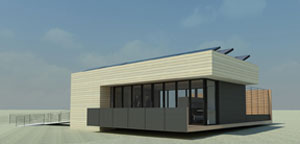
|
 |
 |
Rendering of what the house will look like by Greg Demchak, Damian Liddiard and Colin Booth.
|
|
By Keith Cheveralls
An
assembly of students, local officials, professors, and donors broke
ground on a solar-powered house that will be Boston's entry in the
Department of Energy's 2009 Solar Decathlon, a biennial competition to
build a viable, fully-functional solar-powered home. Teams from Tufts
University and the Boston Architectural College (the BAC) are
collaborating on the design and construction of the project, dubbed the
Curio House, which will compete in October with entries from 19 other
schools from around the world.
While past contests have been won
by groups who focused on maximizing the energy-efficiency of their
designs, Tufts and the BAC are taking a broader approach, explained
Bill Moomaw, professor of international environmental policy at Tufts
and one of the project's leaders.
"What we need to do is bring
solar panels to everybody. We don't want to just build a solar house.
We want to build an affordable house," he said at the groundbreaking
ceremony.
By integrating the environmental and economic sides of
sustainability, the project will emphasize that "everything is
connected," said Jeff Stein, Dean of the BAC. "Today, there is only one
ecology, one big system of which we are all a part," he explained.
Architects and builders, he implied, must consider the sustainability,
not just the affordability, of their buildings.
The house will
be small-only 800 square feet, as stipulated by the contest rules-but
will contain many innovative and affordable features, said Kevin Horne
in a presentation following the groundbreaking. Horne, a BAC graduate
student, is one of the project's student directors.
He explained
that the roof of the house will be covered not only with solar panels
but also with "solar collectors," which use the sun's energy to produce
hot water. Rainwater will be collected and used to flush the toilets,
and the interior layout of the house will be easily reconfigurable. The
entrance will even have an airlock to reduce the energy loss associated
with entering and exiting the structure.
"Our vision," Horne
explained, "is to empower people to live sustainably. We don't want to
just build a house, we want to help people to build and live
sustainably."
Medford Mayor Michael McGlynn also attended the
ceremony, and emphasized Medford's longstanding commitment to
environmental education. In what appeared to be a surprise move, he
offered to provide space in Medford to permanently display the
completed Curio House. He expressed hope that by extending the
project's life beyond the end of the competition, the house might
spread public awareness of sustainability issues.
The project
will culminate in October with the exhibition of all 20 completed
structures in a "solar village" on the National Mall in Washington, DC.
The last competition, in 2007, drew over 1 million visitors to its
"solar village," and competition organizers are hoping for an even
higher turnout this year.
Fully funding the Curio house will
cost about $750,000, according to a press release. The project has
received a $100,000 grant from the Department of Energy, Horne said,
and organizers hope to raise the remaining amount through donations
from an array of local businesses and individuals.
More information about the project can be found on its website,
www.livecurio.us.
|
Reader Comments